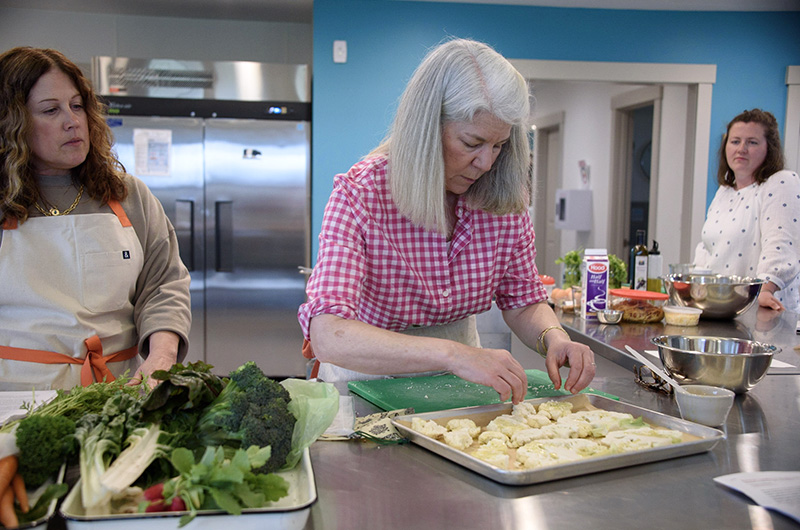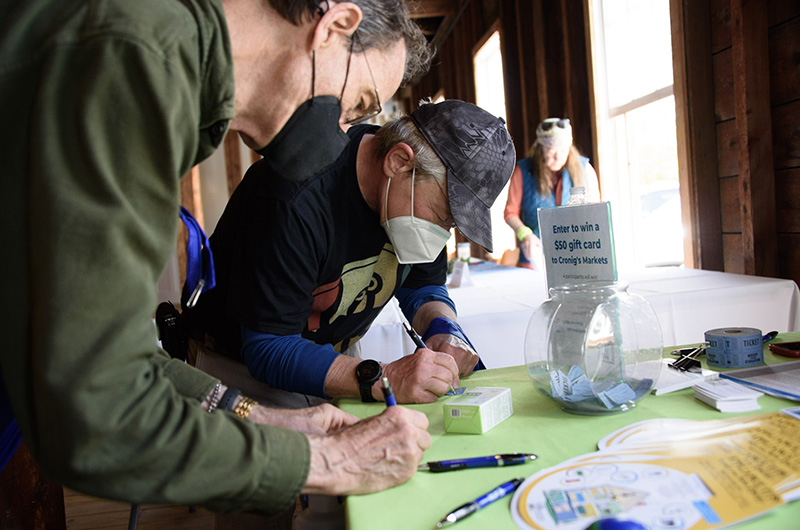Laughter, music and camaraderie filled the Grange Hall on Saturday to celebrate the culmination of Climate Action Week, which saw over 40 events Islandwide aimed at informing and empowering Islanders.
Outside the hall, Tristan Israel and his band strummed folk rock songs while Goldie’s Rotisserie served up cold brew and sandwiches. Cottage City Oysters set up shop on the porch and dished out free samples.
Inside, people milled about the first floor hall where Island conservation groups passed around information about climate change. The Interfaith Climate Action team handed out small stalks of red cedar wrapped in damp newspaper. Island Health Care had a piece of cardboard with circles cut out for people to throw bean bags into. Each circle corresponded to information about ticks.
Art from Island school kids was tacked to three bulletin boards as part of the Vineyard Conservation Society art and writing contest. Paintings and pictures from winners and honorable mentions scattered the boards. One painting showed a young woman wading knee-high in the ocean on a cloudless summer day. But the caption accompanying the picture was more foreboding: it wondered how many more of these days will be possible if the world doesn’t do more to combat climate change.
This was the tone of the weeklong event, providing information in a knowledgeable and often fun way, but not shying away from the potentially devastating effects of global climate change.
Earlier in the week, Noli Taylor, Alli Fish and Andrew Woodruff of Island Grown Initiative led a tour of the organization’s regenerative farm, taking participants back to farming’s roots. A major tenet of regenerative farming is growing cover crops, Mr. Woodruff and Ms. Fish explained. Cover crops — often grasses, legumes and brassicas — help cultivate soil through their own natural contributions rather than using synthetic fertilizers.
Ms. Fish explained that cover crop roots help loosen the soil, and legumes help introduce nitrogen. Brassicas have deep roots that can reach nutrients below other plants’ reach.
“The more life you’re supporting above ground, the more life you’re supporting below ground,” Ms. Fish said.
Beyond the farm’s main crops, Island Grown Initiative has begun to return native plants to parts of the farm unsuitable for farming. Ms. Taylor said creating meadows of native plant life could help bring endangered pollinator species back into the environment.

“I think it’s nice to hear what a working farm can do to support biodiversity overall,” she said.
Going from farm to table, on Thursday evening Susie Middleton and Jenny Devivo hosted a climate-friendly cooking class. Ms. Middleton writes and edits Cook the Vineyard for the Gazette and is the newspaper’s special projects editor. Jenny Devivo is the food service director at the West Tisbury School. The duo took the audience through recipes and tips to cut food waste.
Roasted cauliflower steaks, pasta frittata and banana ice cream were all on the menu.
“What’s in my refrigerator has three or four places it can go: the trash can, the stove or the compost bucket,” Ms. Middleton said. “I’m trying to get more of that stuff to the stove. If I look at anything I’m going to throw away, I’m like, no, I can cook that.”

The freezer is your best friend when it comes to saving food, Ms. Devivo added, pulling out two ice trays which she filled with tomato paste to save for later. Coffee, pesto and even wine can all be frozen, she said.
“It’s thinking outside the box . . . trust yourself to know that you are going to do the best you can to save what you can,” Ms. Devivo said.
While cutting up thick slices of cauliflower, Ms. Middleton talked about the importance of using the whole vegetable. To emphasize this point, she popped a piece of raw stem into her mouth, then collected the other stems and pieces of cauliflower too small for a faux steak and put them into a bowl for a stir fry.
Back at the Grange Hall on Saturday an electric vehicle fleet arrived at about 11:15 a.m. after touring the Island. Except for pebbles crunching under tires, the roughly 50 cars pulled in without a sound. Each car was stamped on the outside with a sign which read “drive electric.”
Upstairs, Mark Alan Lovewell and Molly Conole performed a song about climate change in the newly-minted home of the Martha’s Vineyard Film Festival.
“You’re the first people in the universe to hear this song publicly,” Mr. Lovewell said to the crowd. Ms. Conole followed up by telling the audience the message of the song.
“It’s an opportunity to tell the story of what’s happening on our earth right now,” she said.
Afterward, two conservation clubs from the Martha’s Vineyard Regional High School gave presentations about their work.
“The future of our world, for us being young adults, is our future,” said Ingrid Moore, a senior at the high school. “I want to do my part to slow climate change, prevent it, do anything I can to protect our future.”
Back downstairs, members of the climate action week planning committee looked to keep the momentum going after the events of the week ended by providing petitions for people to commit to acting on what they had learned during the week.
Liz Durkee, climate change planner for the Martha’s Vineyard Commission and one of the lead organizers of the event, encouraged everyone to sign the petitions and thanked them for coming.
“This plan is really a community plan,” she said. “And it’s been a real exciting plan to work on.”






Comments
Comment policy »